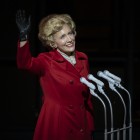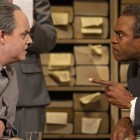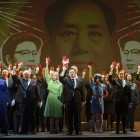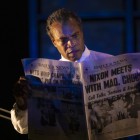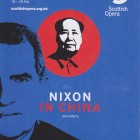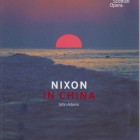Nixon in China 2020Scottish Opera
Read more about the opera Nixon in China
Less than a year after its premiere at Houston, this ground-breaking opera by John Adams received its European premiere at the 1988 Edinburgh Festival. The only change from the original cast was that in Edinburgh the composer himself took the baton. The memorable production by Peter Sellars was later seen in a slightly adapted form, in a co-production by English National Opera and the New York Met, which was relayed to several cinemas in Scotland.
The follow-up work by Adams, Death of Klinghoffer, was even more controversial, dealing with events that were still quite raw. Scottish Opera gave its first production of an Adams work at the 2005 Edinburgh Festival, when Klinghoffer received an excellent presentation. Nixon in China had not until now been seen again in Scotland. While many people in the audience were old enough to remember the previous performances of Nixon in China, and some could even recall the actual events of 1973 that they illustrated, these are now fading into real history.
It was certainly good to see that many of the audience (at this third Glasgow performance) were far too young to have any real memories of either event. It was good to be reminded, at a time when the attempted impeachment of a President is again topical, that Nixon, perhaps remembered largely for the later Watergate scandal, did really perform something positive and long-lasting in opening up the entente with Communist China, essentially closed to the West since 1949.
That many in the audience were unfamiliar with the history seemed to be indicated at the final curtain-calls, when Kissinger (David Stout), historically a generally posiitive figure, was played too much for laughs and received some mild boos. The terrifying Madame Mao, soon to become one of the hated (by the Chinese) 'Gang of Four' was cheered to the rafters. This was largely because of the highly effective performance of her role by Hye-Youn Lee - more recognised in Britain for her performances of Haydn, Mozart, Donizetti and Puccini.
The importance, both political and cultural, of these events clearly needs to be emphasised anew. This cast and production team had an interesting opportunity to do something completely fresh and distinct from the familiar original staging by Peter Sellars. In nearly every respect director John Fulljames succeeded. The staging was quite elaborate, with a revolve used to effect changes almost constantly. The framework was some kind of library storage, with the events recorded in high ranks of archive boxes. Newsreel film and photos were projected throughout the ,performance.
There was no weakness in the performance. All the principals did well, creating memorable characterisations, and generally resisting any temptation to caricature. There was plenty of dance, excellenty performed, even if the second act ballet of the Red Detachment of Women, introduced by Chiang Ch'ing, did rather outstay its welcome. Indeed that was also an issue at the end of the first act, when the state banquet threatened to be overlong.
Perhaps the pacing of this opera is not perfect - the first act does seem overlong. But the last act sequence is quite moving, when the two couples reminisce about their courtships - with Nixon recalling the terrors of the war in the Pacific, which his wife could scarcely understand. Mao and his wife reveal surprisingly westernised attitudes to popular music and dance. I
n a performance and production as consistently inventive and accomplished as this, it certainly seems that the opera will continue to be performed as part of the general repertoire. Led by Joana Carneiro in the pit, the cast didn't put a foot wrong, with Eric Greene an unfamiliar newcomer as a Nixon with plenty of self-doubt but a beaming smile. Julia Sporsén was a remarkably lifelike First Lady. Nicholas Lester made a superbly sympathetic Chou, aware that he had sacrificed any private life to the cause, while Mao (Marl Le Brocq) had clearly managed to enjoy both with his wife (Hye-Youn Lee).
The reception from the audience showed this to be another excellent project completed by Scottish Opera.
Scottish Opera's 2019/20 Season
The season opened at the Edinburgh International Festival with the European premiere of Breaking the Waves by Missy Mazzoli. The autumn performances got under way with a visit to the Lammermuir Festival on 20 September with a single performance in concert of an unusual double bill - Mascagni's Zanetto and Wolf-Ferrari's Susanna's Secret. The Glasgow season opens with a welcome revival of the company's excellent staging of Tosca. There was a Sunday afternoon concert of Iris, another rare work by Mascagni. In the New Year there were new productions of Nixon in China by John Adams as well as Britten's Midsummer Night's Dream. and Sullivan's Gondoliers. Further concerts include a pairing of Mascagni's Cavalleria Rusticana with Leoncavallo's rather less familiar Zingari. There are also concert performances of a late Sullivan piece, Utopia, Limited, as well as the usual Opera Highlights tours of the Highlands and Islands, one in the autumn and a second set in the New Year.
Performance Cast
- Chou En-lai Premier of the People's Republic of China
- Richard Nixon President of the United States
- Henry Kissinger United States Secretary of State and National Security Adviser
- Nancy T'ang First Secretary to Mao
- Second Secretary to Mao
- Third Secretary to Mao
- Mao Tse-tung Chairman of the Communist Party of China
- Pat Nixon First Lady of the United States
- Chiang Ch'ing Madame Mao Tse-tung
